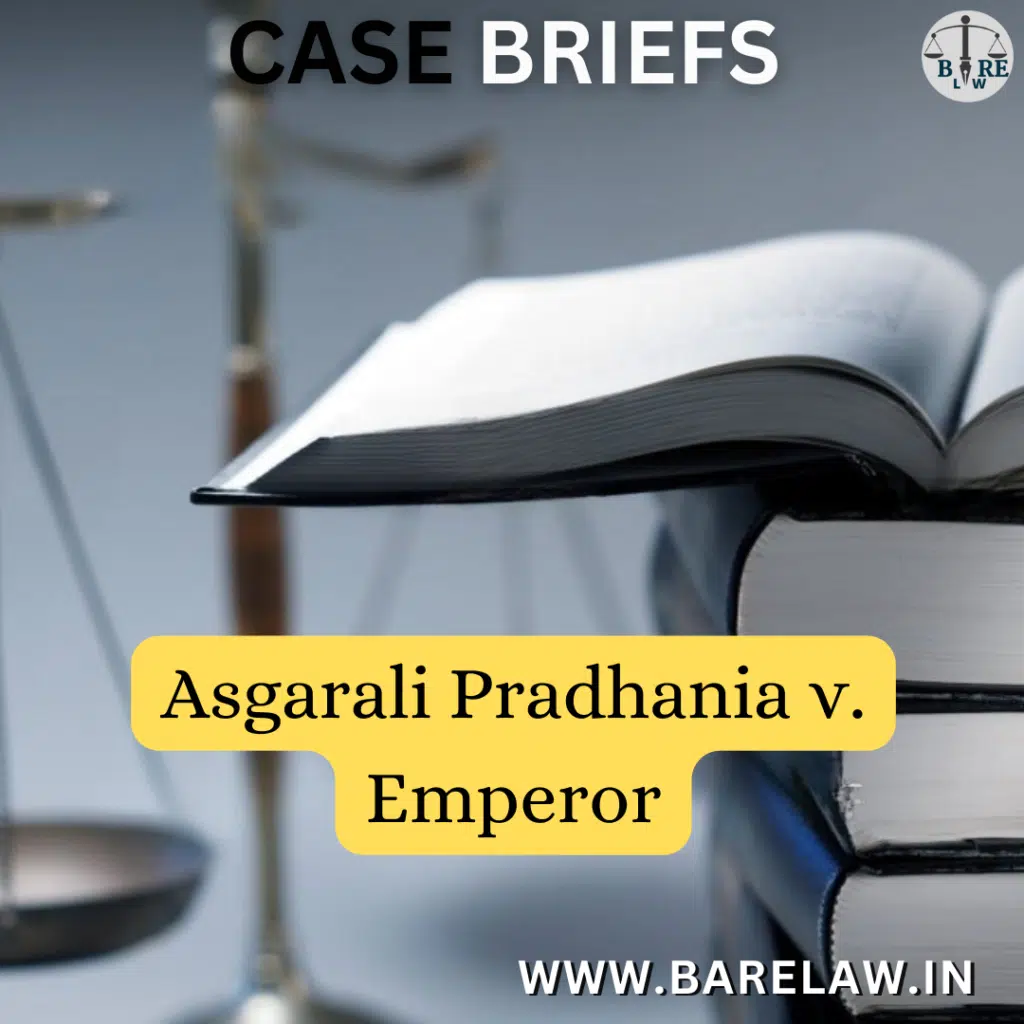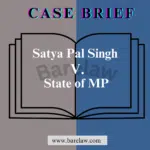
Table of Contents
Asgarali Pradhania v. Emperor
Date of Decision:
July 21, 1933
Facts
Asgarali Pradhania v. Emperor is a case that deals with an attempt to cause a miscarriage under Section 312/511 of the Indian Penal Code, 1860. The following are the facts of the case:
- The Accused: The accused in the case was Asgarali Pradhania.
- The Complainant: The complainant was a 20-year-old woman who had been married but was divorced and living with her parents.
- The Promise: The accused had promised to marry the woman but later denied it.
- The Suggestion: The accused suggested that the woman miscarry the child by taking drugs.
- The Tasting: The woman tasted the drugs but did not take them.
- The Charge: The accused was charged under Section 312/511 of the Indian Penal Code, which deals with the offense of attempting to cause a miscarriage.
- The Conviction: The accused was convicted under Section 312/511 of the Indian Penal Code and was sentenced to rigorous imprisonment for two years.
- The Appeal: The accused appealed the conviction, but the Calcutta High Court upheld the conviction.
- The Ruling: The case established that a mere intention followed by preparations does not constitute a crime and does not provide sufficient grounds to question the accused. The prosecution must prove that the accused had taken some step towards the commission of the offense.
In summary, Asgarali Pradhania v. Emperor is a case that deals with an attempt to cause a miscarriage under Section 312/511 of the Indian Penal Code. The case involved the accused promising to marry a woman, but later suggesting that she miscarry the child by taking drugs. The case established that the prosecution must prove that the accused had taken some step towards the commission of the offense and that a mere intention followed by preparations does not constitute a crime.
Issues
The issues of the Asgarali Pradhania v. Emperor case are as follows:
- Attempt to cause a miscarriage: The case deals with an attempt to cause a miscarriage under Section 312/511 of the Indian Penal Code. The appellant was charged with attempting to cause a miscarriage of a 20-year-old woman who had been married but was divorced and living with her parents. The appellant had promised to marry the woman but later denied it and suggested that she miscarry the child by taking drugs. She tasted the drugs but did not take them.
- Conviction: The appellant was convicted under Section 312/511 of the Indian Penal Code, which deals with the offense of attempting to cause a miscarriage. The Calcutta High Court upheld the conviction and sentenced the appellant to rigorous imprisonment for two years.
- Intention and Preparation: The case established that a mere intention followed by preparations does not constitute a crime and does not provide sufficient grounds to question the accused. The prosecution must prove that the accused had taken some step towards the commission of the offense.
In summary, the Asgarali Pradhania v. Emperor case deals with an attempt to cause a miscarriage under Section 312/511 of the Indian Penal Code. The case established that the prosecution must prove that the accused had taken some step towards the commission of the offense and that a mere intention followed by preparations does not constitute a crime.
Holding
The holdings of the Asgarali Pradhania v. Emperor case are as follows:
- The appellant was convicted under Section 312/511 of the Indian Penal Code for an attempt to cause a miscarriage, but the liquid and powder given by the appellant were not harmful to miscarry the child. Therefore, the appellant cannot be convicted on the ground to attempt to cause a miscarriage under section 511 of the Indian Penal Code, 1860. Hence, the appellant was acquitted.
- The case established that a mere intention followed by preparations does not constitute a crime and does not provide sufficient grounds to question the accused. The prosecution must prove that the accused had taken some step towards the commission of the offense.
In summary, the Asgarali Pradhania v. Emperor case resulted in the acquittal of the appellant for an attempt to cause a miscarriage under Section 312/511 of the Indian Penal Code. The case established that the prosecution must prove that the accused had taken some step towards the commission of the offense and that a mere intention followed by preparations does not constitute it.
Disposition
Asgarali Pradhania v. Emperor is a case that deals with an attempt to cause a miscarriage under Section 312/511 of the Indian Penal Code. The appellant was convicted under Section 312/511 of the Indian Penal Code, of an attempt to cause a miscarriage of a 20-year-old woman who had been married but was divorced and living with her parents.
The appellant had promised to marry the woman but later denied it and suggested that she miscarry the child by taking drugs. She tasted the drugs but did not take them. The appellant was sentenced to rigorous imprisonment for two years. The appellant appealed the conviction, but the Calcutta High Court upheld the conviction. The case established that a mere intention followed by preparations does not constitute a crime and does not provide sufficient grounds to question the accused. The prosecution must prove that the accused had taken some step towards the commission of the offense.
The case also established that there should be a commission of the crime to call it an ‘attempt’ which has not been committed. Therefore, the appellant was not guilty of an attempt to cause a miscarriage under Section 511 of the Indian Penal Code and was acquitted. In summary, the Asgarali Pradhania v. Emperor case dealt with an attempt to cause a miscarriage under Section 312/511 of the Indian Penal Code.
The case established that the prosecution must prove that the accused had taken some step towards the commission of the offense and that there should be a commission of the crime to call it an ‘attempt’ which has not been committed. The appellant was acquitted of the charges under Section 511 of the Indian Penal Code.
Summary
Asgarali Pradhania v. Emperor is a case that was heard by the Calcutta High Court in 1933. The case deals with an attempt to cause a miscarriage under Section 312/511 of the Indian Penal Code, 1860. The following is a summary of the case:
- Facts: The appellant was charged with attempting to cause a miscarriage of a 20-year-old woman who had been married but was divorced and living with her parents. The appellant had promised to marry the woman but later denied it and suggested that she miscarry the child by taking drugs. She tasted the drugs but did not take them.
- Conviction: The appellant was convicted under Section 312/511 of the Indian Penal Code, which deals with the offense of attempting to cause a miscarriage. The Calcutta High Court upheld the conviction and sentenced the appellant to rigorous imprisonment for two years.
- Intention and Preparation: The case established that a mere intention followed by preparations does not constitute a crime and does not provide sufficient grounds to question the accused. The prosecution must prove that the accused had taken some step towards the commission of the offense.
In summary, Asgarali Pradhania v. Emperor is a case that deals with an attempt to cause a miscarriage under Section 312/511 of the Indian Penal Code. The case involved the accused promising to marry a woman, but later suggesting that she miscarry the child by taking drugs. The case established that the prosecution must prove that the accused had taken some step towards the commission of the offense and that a mere intention followed by preparations does not constitute a crime. The appellant was convicted and sentenced to rigorous imprisonment for two years.



